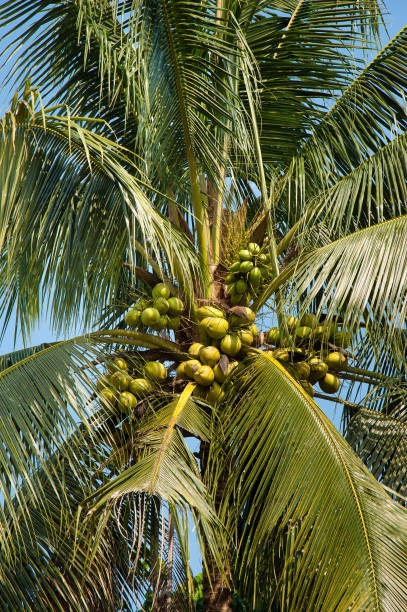Coconut and Crop
How to increase Coconut Production and Crops with Consulting
Coconut is a Profitable Plantation crop – But if you are making Losses from it, what is the purpose of doing it?
Still, if you have under mentioned constraints and wish further development
- ● If your Coconut yields is 40- 50 nuts per palm per year.
- ● Impossible for getting adequate returns from your coconut estate?
- ● Time limited to monitor and manage your coconut estate and it’s Management.
- ● Difficulty find suitable company for practicing the best scientific estate management practices?
- ● Introduced soil/Moisture conservation practicing are willing to introduce as water & soil conservation method to face drought periods?
We are there to help you

With almost 37 years of experience in Planting, DSD can provide the Best solutions you need.
- ● Handle and helping estate administration works
- ● Introducing with mixed and integrated cropping pattern in order to increase Returns.
- ● Introducing drought tolerance by using moisture conservation with own methods.
- ● Increasing coconut yield up to 80- 90 nuts per palm per year by using good agricultural practices and reduce cost of production per nut by using Smart Agriculture and Livestock.
- ● Providing consultancy by expertise on best practices in estate management with routing visit.
- ● Rectification of Proper monitoring and management system of estate on behalf of owners including monthly performance reports.
- ● Collecting proper data in order to Manage under and replanting system to get harvest within 5 years and Provide guidance on investments for your coconut estate
- ● Maximizing profitability of your coconut estate with 80- 90 nuts/Palm per year and Ideal solution with guidance on labor problems.
- ● Introducing Bee keeping tree planting program with environmentally friendly in order to increase bee population with increasing pollination.
- ● Make direct coconut purchases through a fair & transparent pricing mechanism in order to best price
Fertility
(DSD) consultants take pride in being able to help farms identify ways to improve the overall fertility of the farm. Our independent agronomy consultants use science-based information to design a program best suited to the client.
Independent Agronomy Professionals
DSD Agronomy Consultants are independent crop consultants, holding BSc, MSc on Agriculture Certified Crop Advisors (CCA) credentials, who worked with some of the best farms throughout the Sri Lanka. They can help you make the right decisions and work with you on the next steps toward increased profitability for your farm. In Addition if you want to get got price for fresh coconut DSD also helping to you, Our only interest is in learning about you, your farm, and what we can do to provide a plan that will move you forward.
A Complete, Customized Plan
Soil sample analysis and good maps are the foundation for building a strong crop plan, so these are the first components of the plan that we focus on. Working with the farm we gather information about rotation plan, pest management, fertilizer use, and current needs and/or opportunities. The result is a plan that includes our independent recommendations based on the farm’s specific needs. Included are a set of professionally created maps that can help you and your team communicate clearly throughout the crop season. The increasing value of your crops and the increased cost of inputs to grow them make every crop decision more important than ever. It is a great time to evaluate the crop side of your operation and be confident you are putting your nutrient Money, where it will give you the greatest return at harvest time.

Coconut & Crop
In-field Agronomy
By using our agronomy team, you have access to an independent resource to help identify opportunities and make the best decisions to advance your cropping goals. We’ll look at drainage, tillage practices, crop varieties, pest and plant disease, and any other factors that may be influencing yield or preventing optimum nitrogen use.
The DSD agronomy team is dedicated to providing professional and timely service that can enhance your crop program in the following way:
- ● Greater yields through applying DSD proprietary fertility planning that uses field or subfield management appropriate to your farm and its goals.
- ● Improved crop quality by having access to consultants who can evaluate varieties, scout fields, and project optimal harvest dates.
- ● Better control of pests by helping you to develop an appropriate application strategy and providing a professional assessment of your fields.
- ● Optimum nutrient use by helping you to identify where and how much nitrogen will be appropriate for maximum growth while minimizing fertilizer expense.
Integrated Pest Management
Integrated pest management (IPM) is not a single pest control method but, rather, a series of pest management evaluations, decisions and controls. In practicing IPM, growers and agronomy consultants who are aware of the potential for pest infestation follow a four-tiered approach.
Set Action Thresholds
Before taking any pest control action, IPM sets an action threshold, a point at which pest populations or environmental conditions indicate that pest control action must be taken. Sighting a single pest doe’s not always mean control is needed. The level at which pests will become an economic threat is critical to guide future pest control decisions.
Monitor and Identify Pests
Not all insects, weeds, and other living organisms require control. Many organisms are innocuous, and some are even beneficial. IPM programs work to monitor for pests and identify them accurately, so that appropriate control decisions can be made in conjunction with action thresholds. This monitoring and identification optimizes pesticide use to conserve beneficial organisms and control pests.
Prevention
As a first line of pest control, IPM programs work to manage the crop to prevent pests from becoming a threat. This may mean using cultural methods, such as rotating between different crops, selecting pest-resistant varieties, and planting pest-free rootstock. These control methods can be very effective, cost-efficient, and present little to no risk to people or the environment.
Control
once monitoring, identification, and action thresholds indicate that pest control is required, IPM programs allow for the selection of the proper control method both for effectiveness and risk. Effective, less risky pest controls are chosen first, including highly targeted chemicals, such as pheromones to disrupt pest mating, or mechanical control, such as trapping or weeding. If further monitoring, identifications and action thresholds indicate that less risky controls are not working, then additional pest control methods would be employed, such as targeted spraying of pesticides
Comprehensive Nutrient Management Planning
As the name implies, a CNMP is a “comprehensive”, detailed farm plan which includes professional field and farmstead maps, a plan for balancing and handling manure (nutrient management), an assessment of the farm’s resource concerns and a snapshot of the farm’s fertility. As part of the process, planners include a good deal of professional judgement for improvements in all these areas.
Traditional Field, Soil, Mapping
Every map that accompanies a DSD nutrient management plan or custom fertility plan comes with a set of professionally prepared maps. We start with a technician who will visit the farm and “ground truth” the streams, waterways, field boundaries, wetlands, pasture and woodlands.
They will indicate laneways, wells, sinkholes, ditches, or any other unique characteristics. From here the information goes to our “mapping group” where several professionals are on hand to develop the maps. Once these maps are developed for your farm, we work to keep them updated when you add new ground, when boundaries change or when other circumstances warrant changing them.
Up to date maps are included with all annual plan updates, as well as with the spring fertility binder, and if necessary, fall manure spreading recommendations. We also offer complete farm overview maps which show the entire farm field layout on a poster-size map, allowing for improved communication among the staff.
Contour Line Mapping
Ever-increasing competition for land has led to higher and higher prices, so many farms are choosing to make the most of the land they do have. DSD can help map your fields in preparation for contour drainage or map the contour lines after they have been installed.
There are significant benefits of contour drainage including:
●earlier and later access to fields
● deeper root systems leading to reduced sensitivity to extreme wet or dry
conditions
● Reduction in overland flow which leads to a loss of soil and soil
nutrients.
● increased crop yield
● improved forage quality
Electrical Conductivity (EC)
Soil EC varies with soil texture and organic matter. DSD is advice to carry out this service allows the farm to map soil type variation within fields at a level of precision and accuracy never before possible.
Precision Agriculture
Precision agriculture is site specific crop management focused on managing field variability. Precision agriculture uses technology such as GPS to determine the specific needs of different sites within the field. This leads to a more efficient use of inputs like herbicides, pesticides, irrigation, or fertilizer. This is more sustainable for both the farm and the environment, while also producing higher yields.
Using advanced technology to plant, fertilize and harvest crops is one of the fastest growing areas in agriculture today. Our staff remains committed to helping clients make the best decisions about the next steps to take with their farm operation, and how best to use the data that the technology provides.
Crop Technology Assessment (CTA)
A CTA provides an assessment of your farm’s current precision agriculture capabilities. It will help you identify future strategies, provide you with an action plan, and give you greater confidence that the decisions you make today will be the right ones for tomorrow. These assessments are performed jointly with you, your farm management team, DSD consultant and a precision consultant working Integrated Farming Solutions
Data Acquisition and Smart Information Management
Data collected by precision agriculture equipment, agronomy technicians, or other technology will be analyzed and delivered to the farm in order for them to make strategic agronomic decisions.
DSD consultants will create Field prescriptions, field maps, and yield data reports for use in tailoring the farm’s agronomic program to achieve higher yields. Consultants will teach farms how to extract and utilize data for their benefit and will help upload prescriptions or other data into their planting, yield, or navigation monitor for tracking purposes.
What is included in a Comprehensive Nutrient Management Plan?
A plan that insures nutrients are used ergonomically on the crops with minimal erosion, and insures nutrients are not lost from the farmstead. Includes:
● A crop fertility plan that uses all of themanure nutrients
● Soil and Moisture Conservation, Cultural practices, crop rotation, residuemanagement, and usage of Organic and inorganic available resources.
● Heavy use area protection (minimize bare soil)
● Animal mortality (composting?)
● Waste management storage, transfer, and useage.
● Barnyard water management system
● Feed management.
● Beekeeping and Expedite pollinations methods.
All practices in the plan must be consistent with Natural Resources and Conservation Service standards (NRCS)
Quick Link
Contact Us
077-3782149 | 033-2310145
info@agrilinkservices.com
No -11/2 Swarnajayanthi Mawatha, Walawwaththa, Meerigama.
Postal Code: 11200
©2023. Calforze. All Rights Reserved.

